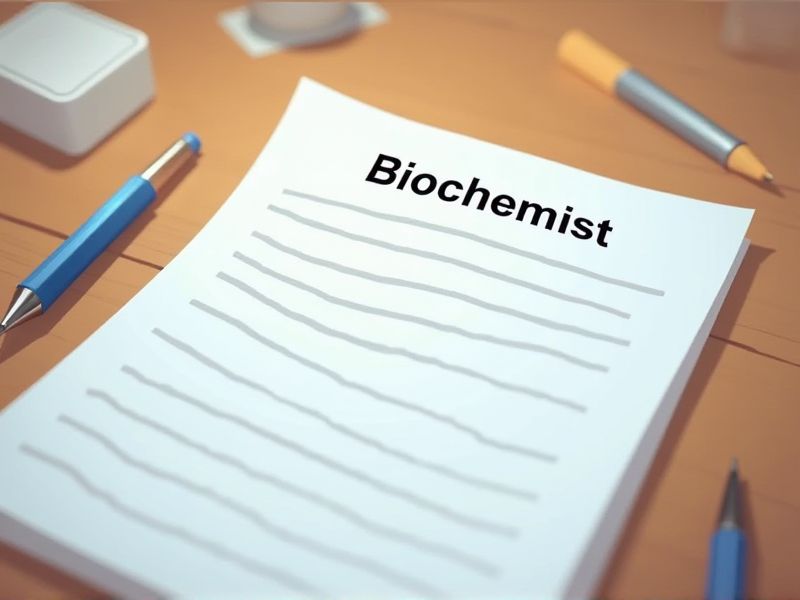
Biochemists often work in sophisticated lab environments where precision is crucial, necessitating specialized certifications to ensure competence and safety. Advanced certifications demonstrate proficiency in complex biochemical techniques, enhancing one's credibility in scientific research and industry settings. Regulatory bodies and employers frequently require specific certifications to comply with national standards and industry best practices. Some important certifications you may need as a biochemist include those in lab safety, quality control, and specific analytical techniques.
ASCP Board Certification - Medical Laboratory Scientist (MLS)
ASCP Board Certification for Medical Laboratory Scientists signals a recognized standard of excellence and competency in laboratory practices, which boosts a biochemist's credibility. Having this certification can widen a biochemist's career opportunities, as many employers prefer or require certified individuals for medical laboratory positions. The certification process reinforces a broad range of technical skills and knowledge, enhancing a biochemist's ability to perform and interpret complex diagnostic tests. Certification helps ensure adherence to high-quality standards in lab settings, which is crucial for accurate and reliable biochemical research and diagnostics.
ASCP Board Certification - Specialist in Clinical Chemistry
ASCP Board Certification as a Specialist in Clinical Chemistry validates a biochemist's expertise in clinical laboratory science. The certification enhances job opportunities and career advancement given its recognition by employers. Holding this certification assures employers of a candidate's commitment to maintaining high standards and up-to-date knowledge in clinical chemistry. It serves as a benchmark for assessing the competency and depth of skills crucial for complex problem-solving in clinical settings.
CLIA Certification for Clinical Laboratory Testing
CLIA certification ensures that clinical laboratory testing adheres to established quality standards, which directly affects the accuracy and reliability of test results. For biochemists, this certification is crucial to maintain public trust and confidence in diagnostic procedures. It mandates regular quality assessments and proficiency testing, emphasizing a biochemist's role in delivering precise and prompt analyses. Certification also aligns laboratory operations with federal standards, minimizing errors and potentially reducing legal liabilities.
IFCC Certified Clinical Chemist
The presence of an IFCC Certified Clinical Chemist ensures standardized measurement and enhanced accuracy in biochemical analyses. This certification equips professionals with advanced methodologies critical for reliable diagnostic testing. Laboratories benefit from expertise in quality control and adherence to international guidelines, reducing errors. The involvement of a certified specialist can improve patient outcomes by providing precise biochemical insights.
Certified Laboratory Director (CLD) Certification
The Certified Laboratory Director (CLD) Certification is essential for biochemists because it verifies their leadership and operational capabilities in managing laboratory environments. It ensures biochemists possess the technical skills and knowledge to uphold stringent safety and accuracy standards in biochemical testing. This certification enhances credibility, facilitating trust from regulatory bodies and stakeholders in various biochemical industries. Achieving CLD Certification often leads to career advancement and increased responsibilities, providing professional recognition and competitive advantage.
Good Laboratory Practice (GLP) Certification
Good Laboratory Practice (GLP) certification ensures that biochemists adhere to standardized procedures, which promotes consistency and reliability in experimental results. This certification helps in maintaining regulatory compliance, which is crucial for the approval of biochemical products and pharmaceuticals by governing bodies. GLP certification acts as a quality assurance mechanism, safeguarding against procedural errors that could lead to inaccurate or misleading data. It also enhances the credibility and trustworthiness of a biochemist's work within the scientific community and industry stakeholders.
HAZWOPER Certification
HAZWOPER Certification provides biochemists with essential knowledge of handling hazardous substances safely, reducing the risk of chemical exposure. This training ensures compliance with OSHA standards, minimizing legal liabilities for employers while maintaining a safe working environment. Understanding emergency response procedures equips biochemists to effectively manage potential chemical spills or accidents. The certification enhances a biochemist's credentials, increasing employability in industries dealing with hazardous materials.
Quality Assurance/Quality Control (QA/QC) Certification
Obtaining a QA/QC certification ensures a biochemist can adhere to strict regulatory standards and maintain the integrity of laboratory processes. The certification provides them with a structured approach to identify, mitigate, and manage potential errors or deviations in experimental outcomes. Employers often seek certified professionals because they demonstrate a commitment to quality and reliability in producing accurate, reproducible results. Without this certification, a biochemist may face challenges in demonstrating their competence in quality management, which could impact career advancement and industry trust.
Six Sigma Green Belt Certification
Possessing a Six Sigma Green Belt Certification equips biochemists with essential skills in process improvement, which directly enhances laboratory efficiency and productivity. This certification provides a structured methodology to identify and eliminate errors in experimental processes, leading to more reliable and accurate results. It fosters a strong foundation in data-driven decision-making, enabling biochemists to optimize resource utilization and minimize waste. Green Belt holders can better lead cross-functional teams, promoting collaboration and innovation in research projects.
Project Management Professional (PMP) Certification
Possessing a PMP Certification equips a biochemist with structured project management skills, enhancing their ability to lead complex research projects efficiently. With PMP training, a biochemist can better manage project timelines, budgets, and resources, crucial for successful experimental outcomes. The certification provides credibility and can enhance a biochemist's career progression by demonstrating their commitment to professional development. In collaborative research environments, PMP Certification facilitates improved communication and coordination among interdisciplinary teams, leading to more effective project delivery.
Summary
Gaining certifications as a biochemist can lead you to increased job opportunities and higher earning potential. These credentials often result in enhanced professional reputation and recognition within your field. With certifications, employers may view your expertise as up-to-date and aligned with industry standards. Your career advancement prospects could improve, with potential roles in leadership or specialized areas becoming more attainable.
